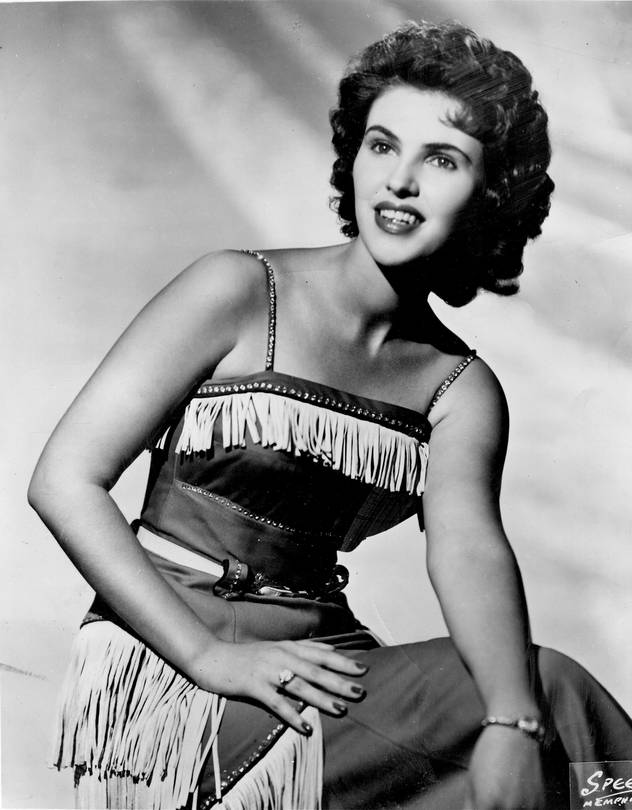Introduction
Wanda Jackson is popularly proclaimed as “The Queen Of Rockabilly” or “The First Lady Of Rockabilly,” one of the few known female stars of the country and rockabilly genre during the height of the 50s music scene. Born and raised in Oklahoma, Jackson began her professional career while still in high school. She won a talent contest and at 19 she hosted her own music radio program. She went on a brief date with Elvis Presley, who urged her to perform rockabilly music. Under Capitol Records she released her first non-album single “I Gotta Know” which reached #15 in the country charts. In 1961 Jackson achieved her highest top 10 country hit with “In The Middle of a Heartache.” During the mid- and late 60s Jackson was recording foreign-language hits and became a star particularly in Germany and Japan. She also recorded a mix of country and gospel songs in the 70s. In the 21st century she enjoys a resurgence in her career following a revival of the rockabilly genre – she has collaborated with Jack White (of the White Stripes) for the 2011 album The Party Ain’t Over. Her latest album Unfinished Business was released in 2012.
Early life and exposure to music
“The Queen of Rockabilly” and “The First Lady of Rockabilly” — those are the titles bestowed upon Wanda Jackson, who was a true rebel in the still-conventional era. Wanda Lavonne Jackson was born on October 20, 1937 in Maud, Oklahoma, but she later spent much her life in nearby Oklahoma City.
Wanda’s father, Tom Robert Jackson, was her earliest and greatest musical influence. He himself had been a professional musician when the Depression forced him to keep his musical career on hold and find for a more practical job. He hoped to continue his musical aspirations on his daughter, whom he taught to play guitar and piano. Tom also took Wanda to live country music performances, which left a big and lasting impression on her. He also encouraged his daughter to sing.
By the time she was in high school, Wanda Jackson had already been singing for the local radio station in Oklahoma. She eventually had her original 15-minute radio spot extended to 30 minutes. Her radio exposure led to her discovery by country boogie guitarist Hank Thompson. With Thompson, Jackson recorded a few songs for Capitol Reocords, including their duet “You Can’t Have My Love.” The single reached the top 10 country in 1954. Despite this, Capitol refused to sign her as a solo artist, saying that “Girls don’t sell records.” Instead, Thompson got Decca Records to sign her.
Jackson’s encounter with Elvis Presley
She didn’t get to tour until she finished high school. In the beginning of her career, Jackson’s father stood as her manager and chaperon. Jackson also encountered another upstarting young singer, Elvis Presley, with whom she shared a bill on one of their “package tours.” The two later briefly dated, but Elvis continued to view her as his own peer. He encouraged her to sing and play more rock and roll and rockabilly, both of which were novel genres then. Elvis proved to be one of Jackson’s biggest musical influences.
Rising to fame as the “Queen of Rockabilly”
Jackson later took on a risk by recording country on one side of the record and then the fast-paced rockabilly on the other. Fortunately, this approach worked. Soon, her name began to rise in the new world of rock and roll and rockabilly.
Jackson scored charting singles such as “Let’s Have a Party” (#37 pop), her self-penned hit “Right or Wrong” (#29 pop, #9 country, #9 adult contemporary), and “In the Middle of a Heartache” (#27 pop, #6 country). There are interesting songs too such as the wild and suggestive “Fujiyama Mama,” which Jackson also wrote. Her other material also consisted of many radically re-gendered versions of songs originally performed by men. They include Elvis’ own song “Party” (from where “Let’s Have a Party” was derived) as well as Jerry Lee Lewis’ “Whole Lotta Shakin’ Goin’ On” and The Robins’ “Riot in Cell Block #9.”
Jackson earned the title of “Queen of Rockabilly,” proving that women can rock too. Moreover, she added the much-needed glamour and sass to the country music stage.
Post-rockabilly career: success with country and gospel music
When rockabilly fell out of favor, by the early 1960s Jackson turned to a successful country career, where she placed many hits on the country chart. Her husband, IBM programmer Wendell Goodman, had become her new manager by that time. In 1971, the couple embraced Christianity. Jackson relayed her newfound faith by singing and recording gospel songs, which she found considerable success.
Jackson’s rediscovery of her rockabilly roots
Thankfully, the revival of the rockabilly genre embraced a new generation of younger fans. Jackson decided to take advantage of the renewed interest in rockabilly, and soon found herself performing in many rock and roll and rockabilly festivals. Even in the 21st century, Jackson was still active in recording and touring.
One of her admirers was former White Stripes member Jack White, whom Jackson worked with for her new album The Party Ain’t Over. It was released on White’s own indie label Third Man Records in 2011. Her latest album Unfinished Business was issued on Sugar Hill Records in 2012.
Jackson’s impact on the music industry is undeniable. Not only she broke the musical conventions then, but her sense of independence in the music industry also served as an inspiration to every aspiring female singer. She was inducted into the Rock and Roll Hall of Fame in 2009 as an “Early Influence.”
